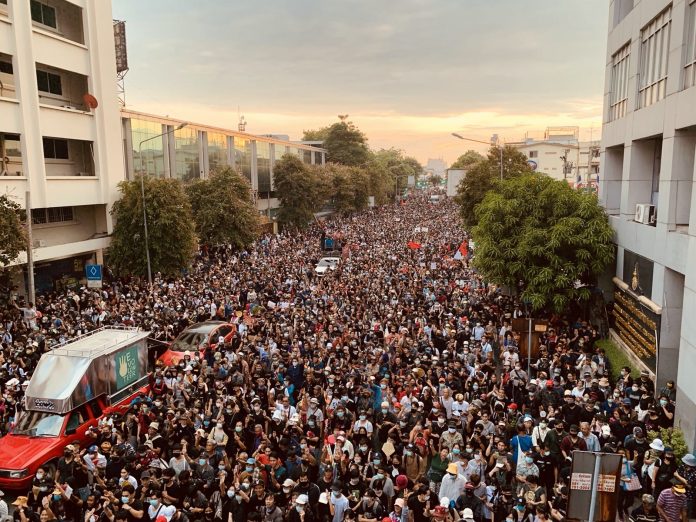(Jakarta, 15 October 2020) ‒ The state of ‘severe’ emergency in Thailand declared in the wee hours of the morning is aimed at centralising the Thai government’s power and preventing the legitimate expression of dissent, the Asian Forum for Human Rights and Development (FORUM-ASIA) said today.
The rights group said the ‘severe’ emergency, which bans gatherings of five people or more, is aimed at preventing thousands of protestors who descended into central Bangkok from exercising their right to fundamental freedoms while instilling fear.
Police announced the state of ‘severe’ emergency, arguing that ‘groups of people’ had carried out ‘unlawful public gatherings’ in the city, inciting ‘chaos and public unrest’.[1] Police singled out the act of protesters raising the three-finger salute as a Thai royal motorcade passed through. The salute, adopted from a dystopian sci-fi movie, is a symbol of defiance in Thailand’s democracy movement.
Police arrested protest leaders Arnon Nampa, Rung Panusaya ‘Rung’ Sithijirawattanakul, Prasith Utharoj, and Parit ‘Penguin’ Chiwarak. Although police had dispersed crowds of protestors this morning, by 3pm Bangkok time, protestors had regrouped at the Ratchaprasong intersection in central Bangkok.
‘The state of emergency, arbitrary arrests and crowd dispersals have no grounding in international human rights law, which respects the rights to freedom of expression and freedom of peaceful assembly. The government’s actions are attempts to silence the movement whose calls for reform have found a voice among ordinary people,’ FORUM-ASIA said.
The International Covenant on Civil and Political Rights, and General Comment 37 recognise the right of individuals to shape society and express themselves through peaceful assembly. It prohibits the State from conducting any unwarranted interference in a peaceful assembly.[2]
For months, protesters have been calling for an end to the harassment of activists and protest leaders, and a revision of the Constitution, among other demands. Tens of thousands gathered in Democracy Monument on 14 October, a date which commemorates the student uprising in 1973 that briefly ended the decade-long military dictatorship.
Under Section 11 of the Emergency Decree[3], excessive power is provided to the Prime Minister to issue several measures to curb the ‘severe’ emergency. Government orders, apart from the ban on gatherings consisting of five or more people, includes the prohibition of publishing news ‘that could create fear or intentionally distort information, creating misunderstanding that will affect national security or peace and order’. It also allows authorities to prevent individuals from entering any designated area.
The state of emergency comes after months of intimidation against protesters which have included the widespread use of judicial harassment against activists and human rights defenders. Authorities have arbitrarily arrested activists and filed charges against them under the country’s slew of repressive laws that carry hefty sentences. In recent months, more than 60 protest leaders have faced charges for organising and/or participating in protests.[4]
Yesterday, the police arrested 21 protesters including pro-democracy leader Jatupat ‘Pai Dao Din’ Boonpattararaksa. Police were also recorded manhandling protesters in crowds.[5]
Despite Thailand having undergone elections in 2019, the system of military rule for many people has remained largely unchanged. The military-drafted 2016 Constitution, which reinforces the disproportionate powers of the military, continues to guide the political milieu. Human rights defenders and activists continue to be silenced under the current regime.
‘Under international human rights standards, emergency decrees should be legal, necessary, proportionate and time-bound. Thailand’s state of ‘severe’ emergency fails to meet these principles. It instead reinforces a system where dissent is continuously stifled. The protesters’ demands for widening civic space and push for fundamental freedoms are consistent with Thailand’s obligations under the International Covenant on Civil and Political Rights. The government has the duty to ensure these are protected,’ FORUM-ASIA said.
**
For a PDF version of this statement, please click here.
For further information, please contact:
- East Asia and ASEAN Programme, FORUM-ASIA, [email protected]
For media inquiries, please contact:
- Communication and Media Programme, FORUM-ASIA, [email protected]
[1] https://www.bbc.com/news/world-asia-54548988
[2] https://www.ohchr.org/EN/HRBodies/CCPR/Pages/GCArticle21.aspx
[3]http://210.246.148.76/thaiquest/getFileProxy/comment.aspx?url=%2Fdata%2Fdocument%2Fext810%2F810259_0001.pdf
[4] https://www.tlhr2014.com/?p=22039
[5] https://news.thaipbs.or.th/content/297323


